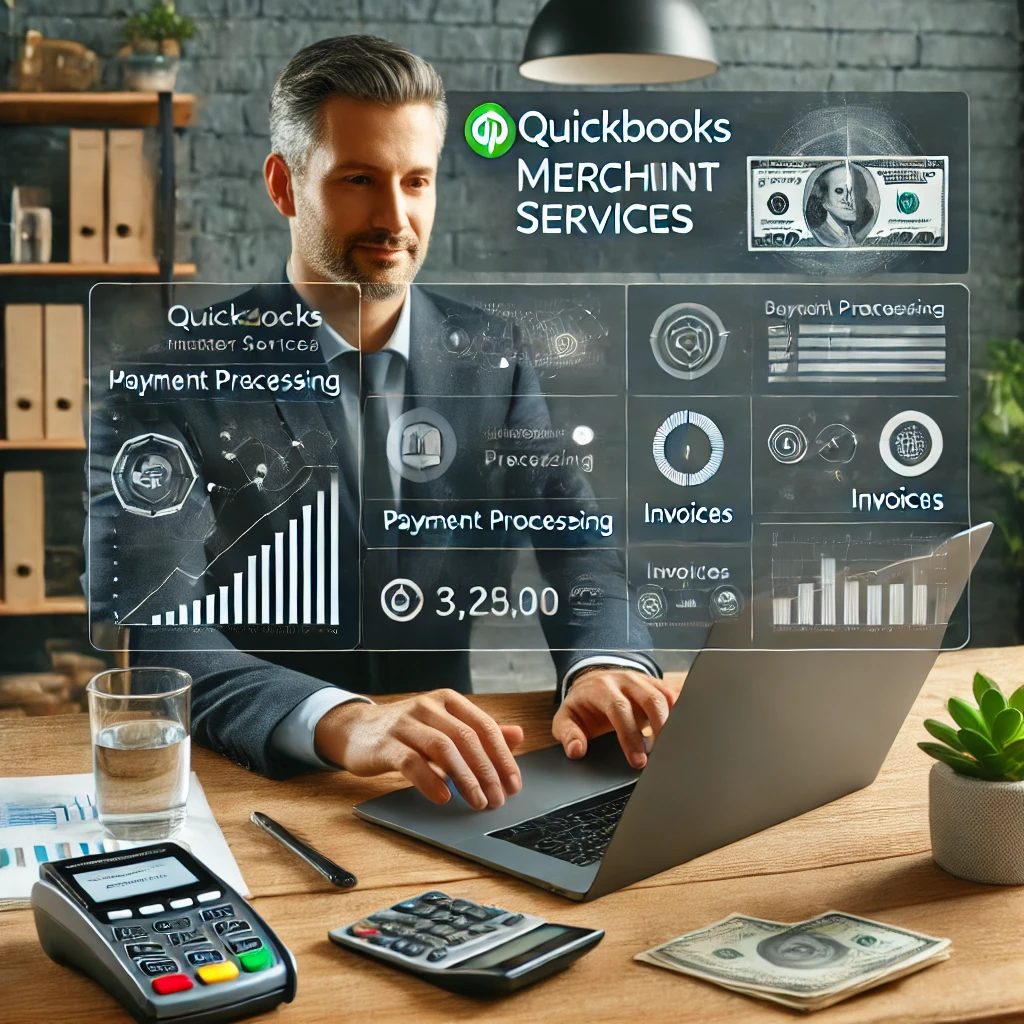Modern business success depends heavily on good payment processing speed. QuickBooks Merchant Services gives companies features to manage payments and finances while simplifying accounting tasks. QuickBooks provides customizable merchant services to fit the requirements of new and existing business clients.
We will examine all aspects of QuickBooks Merchant Services including its capabilities and advantages plus pricing details to show how startup businesses can use it better handle their finances.
What Are QuickBooks Merchant Services?
QuickBooks Payments represents the payment processing system that Intuit offers to its customers. Through QuickBooks software companies directly process payments from credit cards and debit cards as well as ACH bank transfers and mobile systems.
Key Features of QuickBooks Merchant Services
- Multiple Payment Options: Accept credit/debit cards, ACH transfers, and online payments.
- Seamless QuickBooks Integration: QuickBooks integrates smoothly with our system to transfer data to both QuickBooks Online and QuickBooks Desktop automatically.
- Mobile Payments: Through the QuickBooks mobile app businesses get payments direct to their mobile device.
- Invoicing and Recurring Payments: You can prepare and forward bills that let buyers make payments with automatic billing turned on.
- Security and Fraud Protection: The service uses strong security measures to defend your transactions against hackers.
- E-commerce Compatibility: Integration with online stores and marketplaces.
- Fast Deposits: The system puts money directly into your bank account within the next one business day.
How QuickBooks Merchant Services Work
QuickBooks Merchant Services serves as the processing platform that helps companies take payments from various payment methods. Here’s how it works:
- Setup & Integration: Companies can join QuickBooks Payments and add it to their QuickBooks Online or Desktop platform.
- Accept Payments: Customers can pay us using major credit/debit cards as well as ACH and mobile payments products.
- Automatic Recording: QuickBooks handles transaction entry automatically to decrease staff entry work.
- Funds Transfer: Money transfers to the business account occur directly from payment transactions normally within one or two days.
- Reporting & Reconciliation: Business owners see and match payment activity as it happens.
Why Startups Should Use QuickBooks Merchant Services
New businesses need to control their money efficiently. QuickBooks helps new businesses simplify their payment activities and preserve accurate financial records.
Benefits for Startups
- Simplified Accounting: All payments flow directly into QuickBooks through synchronization to spare business owners from handling financial records manually.
- Improved Cash Flow: The faster funds deposit system helps businesses maintain normal cash flow operations.
- Professional Invoicing: Create billing documents through the system to handle payments better.
- Affordable Pricing: You only pay as you need services without any large initial investment.
- Scalability: When your startup develops QuickBooks will support expanding business functions.
QuickBooks Merchant Services Pricing
Price of services depends both on chosen plans and transaction types. This section displays the regular payment rates for the service:
Pay-as-You-Go Pricing (No Monthly Fee)
- Swiped Transactions: 2.4% + $0.25 per transaction
- Keyed Transactions: 3.4% + $0.25 per transaction
- ACH Bank Transfers: 1% per transaction (max $10)
Monthly Subscription Plans
QuickBooks offers subscription plans for companies with significant transaction numbers that decrease their payment rates.
- Basic Plan: $20/month with lower transaction fees
- Advanced Plan: $40/month with premium features and priority deposits
Other services charge separate fees for processing chargebacks, refunds, and overseas transactions.
How to Set Up QuickBooks Merchant Services
QuickBooks Merchant Services setup process takes a few basic steps to complete.
- Sign Up: Visit the website of QuickBooks Payments to choose a payment plan and sign up.
- Connect Bank Account: Join Your Business Bank Account to Receive Deposit Transfers.
- Integrate with QuickBooks: Link QuickBooks Payments with your Online or Desktop version of QuickBooks.
- Start Accepting Payments: Begin Collecting Payments Through QuickBooks POS or Invoices Plus Online Checkouts.
- Track Transactions: Keep a detailed record of all finances earned and paid within QuickBooks platform.
Comparing QuickBooks Merchant Services with Other Payment Processors
The main distinctions between QuickBooks Merchant Services and payment processors PayPal, Square, and Stripe become clear through analysis. QuickBooks stands out from PayPal, Square, and Stripe by smoothly integrating with accounting which none of these three rivals provide. The 2.4% plus $0.25 charge for swiped payments from QuickBooks Payments costs less than PayPal and Stripe but more than Square at 2.6% plus $0.10. QuickBooks Payments joins ACH transfers with a 1% fee plus a maximum $10 expense whereas Stripe enables users to pay 0.8% plus $5 and PayPal along with Square don’t process ACH transfers.
QuickBooks includes an optional monthly fee package but PayPal, Square, and Stripe do not impose any such fees. All four systems including QuickBooks Payments, PayPal, Square, and Stripe support mobile payment solutions. These payment processors let businesses add their shopping website directly to automatically process online payments. QuickBooks Merchant Services best serves companies that use QuickBooks accounting because it supports their existing workflow needs yet others offer better features for price and e-commerce needs.
Why Choose QuickBooks Merchant Services?
- QuickBooks Merchant Services suits businesses that use QuickBooks accounting products today
- The payment platform charges lower fees for transactions than other similar providers
- The system directly incorporates payment data to eliminate the requirement of working with outside payment reconciliation tools.
- The platform enables money transfers through ACH bank accounts to lower transaction expenses.
QuickBooks for Startups: Additional Financial Tools
In addition to its merchant services QuickBooks for startups provides full financial management tools to new business owners such as:
- Expense Tracking: QuickBooks records expenses automatically based on their proper category.
- Payroll Processing: Handle payrolls and tax requirements without effort.
- Inventory Management: Check and Control Products and Supplies Across Your Inventory.
- Tax Preparation: The system eases tax filing duties through tax preparation tools built directly into the software.
Common Issues and Troubleshooting for QuickBooks Merchant Services
Similar to other payment processing systems QuickBooks Merchant Services faces technical problems. These are typical system problems plus their resolutions:
1. Payment Processing Delays
- Examine if the payment needs to undergo fraud verification steps.
- Link bank accounts to the system properly.
2. Transaction Declined Errors
- Verify the customer’s payment information.
- Examine if the account possesses enough deposits to process the transaction successfully.
3. Integration Issues
- Keep QuickBooks updated with its latest version release.
- Correct the QuickBooks Payments account connection when needed.
QuickBooks E-commerce Integration
Digital businesses depend greatly on effective ways to handle their financial transactions as digital markets expand rapidly. The QuickBooks e-commerce connection enables online sellers to simplify accounting and monitor sales while QuickBooks handles automated financial reporting when the e-platform syncs with the software.
Benefits of QuickBooks E-commerce Integration
1. Automated Accounting and Bookkeeping
The connection between QuickBooks and your e-commerce store handles business transactions automatically to cut manual data entry. This ensures accurate financial records.
2. Real-time Sales Tracking
Check your sales results from all shopping platforms like Shopify, WooCommerce, Amazon and eBay. QuickBooks gives you live reports for your business income and costs.
3. Simplified Tax Management
QuickBooks works out sales tax automatically from product types and sales areas while following tax rules throughout your business year.
4. Inventory Management
Link your products between QuickBooks and your online store to stop selling more than available supplies and keep enough merchandise on hand.
5. Faster Reconciliation
The system connects bank operations with online sales automatically caught errors and delivers exact financial results.
6. Improved Cash Flow Management
Through QuickBooks business owners receive clear insights about their cash movement since the program tracks both payment receipts and spending records which support a healthy money balance.
7. Enhanced Customer Experience
Customers can shop without interruptions thanks to automatic payments because this system enhances their buying experience.
How to Integrate QuickBooks with Your E-commerce Platform
- Choose an Integration Method: Decide Between QuickBooks Tools and Third-Party Applications that Connect Between QuickBooks and Shopify Webgility A2X databases.
- Connect Your Store: Link your shopping area to QuickBooks through their setup processes.
- Sync Transactions: Let the system automatically link order data from your business to sales, refund, and expense records.
- Monitor & Optimize: You should check reports for better money handling.
Businesses that link to QuickBooks e-commerce gain better financial oversight while decreasing manual work and mistakes. Small and developing companies can manage their money better when they connect QuickBooks to their online sales platform. Begin using this system now to simplify your business financial area management.
Bottom Line
QuickBooks Merchant Services delivers a suitable payment processing system that works well for startups and mature businesses. Using QuickBooks accounting software alongside QuickBooks Merchant Services lets users run finances better with complete transaction handling and precise accounting results.
QuickBooks supports new businesses and offers apps to do accounting work more efficiently including sending invoices and managing expenses. Companies that choose QuickBooks Merchant Services will improve their operations and customer payment transactions while laying the groundwork for stable financial performance.





